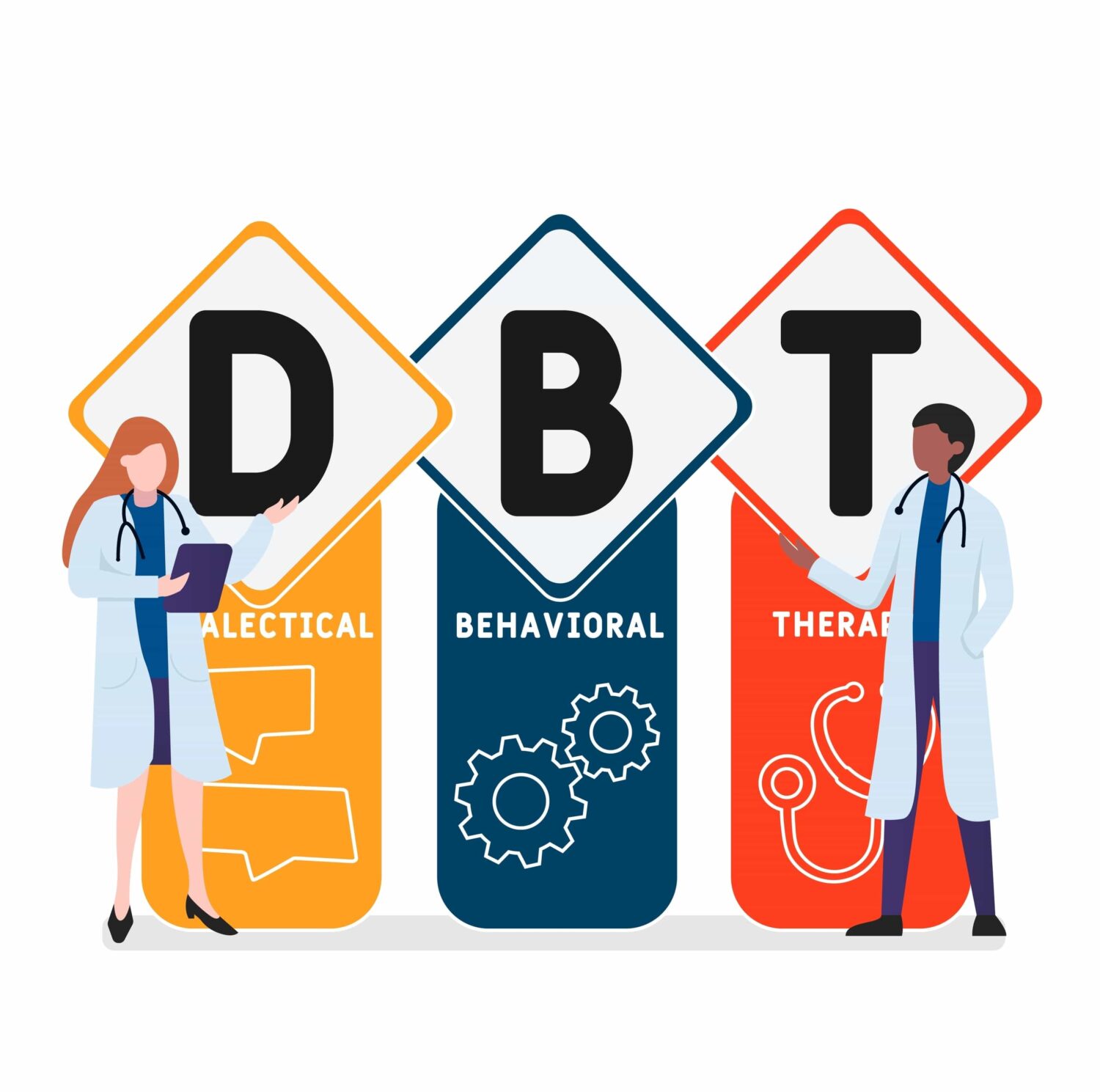DBT is particularly effective for individuals with Borderline Personality Disorder (BPD), as it helps them develop healthier relationships by improving emotional regulation, communication, and distress tolerance. Many individuals with BPD experience intense emotional fluctuations that can strain relationships, but DBT teaches skills to stabilize emotions, set boundaries, and build stronger interpersonal connections. Through interpersonal effectiveness strategies, individuals learn to navigate social interactions in a way that fosters mutual understanding and reduces conflict.
Dialectical Behavior Therapy


Rock View Recovery is where healing begins with understanding and compassion. We offer specialized Dialectical Behavior Therapy (DBT) to help individuals overcome mental health challenges and addiction. Our company is committed to providing psychotherapy that fosters emotional regulation techniques and long-term well-being. Located in the Phoenix metropolitan area, our programs integrate coping strategies, counseling, and comprehensive treatment options to ensure holistic care. Through our services, individuals seeking restoration and renewal can find solutions for lasting recovery, sobriety, and emotional stability.
Why Choose Rock View Recovery?
At Rock View Recovery, we take a personalized and compassionate approach to rehabilitation, making sure everyone gets the support they need to thrive. Our programs blend advanced therapy techniques, expert guidance, and a safe, nurturing environment to promote lasting recovery.

Compassionate Care
Seeking help for addiction and mental health challenges requires immense courage, and our team is here to support you every step of the way. At Rock View Recovery, we prioritize individualized attention, ensuring that every client receives a tailored treatment plan suited to their unique needs.
Our multidisciplinary team consists of licensed therapists, medical professionals, and wellness specialists who work collaboratively to address both the emotional and behavioral aspects of recovery. We emphasize self-awareness, personal growth, and emotional resilience, empowering our clients to rebuild their lives in a supportive, judgment-free environment.

DBT-Focused Approach
Dialectical Behavior Therapy is the foundation of our treatment model, offering individuals a structured, evidence-based approach to emotional regulation and stress management. DBT helps clients learn how to navigate overwhelming emotions, improve interpersonal relationships, and develop healthier coping mechanisms.
Through individualized therapy sessions, skills training, and real-world application, clients gain the ability to manage distress, practice mindfulness, and make informed decisions that support their well-being. Our DBT-focused approach ensures that individuals not only recover but also acquire lasting tools for maintaining stability and mental wellness.

Holistic Healing
Recovery is about more than just treating symptoms; it’s about healing the whole person. Our holistic approach integrates a variety of advanced therapeutic techniques, including brain-centered technology, mindfulness training, physical wellness activities, and creative therapies.
We recognize that addiction and mental health challenges affect both the body and mind, so we incorporate nutrition counseling, yoga, meditation, and experiential therapies to promote balance and resilience. By treating the entire individual—mind, body, and spirit—we help our clients build a strong foundation for long-term recovery and personal fulfillment.

Phased Treatment for a Smooth Transition
We understand that recovery is a journey, and we provide a structured, phased treatment model that supports individuals every step of the way. Our programs range from intensive residential treatment to structured outpatient programs and transitional living arrangements.
The goal is to ensure a seamless transition from one level of care to the next, allowing clients to regain independence while continuing to receive professional guidance and support. Whether you are in the early stages of treatment or preparing for reintegration into daily life, our phased approach ensures you have the tools to maintain stability and avoid relapse.

Lifelong Alumni Support
Healing doesn’t stop when treatment ends. At Rock View Recovery, we recognize the importance of continued support in maintaining long-term effects. Our alumni program provides ongoing counseling, peer mentorship, group events, and access to community resources, allowing clients to stay connected and engaged with their support network. Through structured aftercare planning and continued accountability, we empower our alumni to sustain their progress, navigate challenges, and lead fulfilling, sober lives.


Signs You Might Need DBT
If you find yourself struggling with intense emotions that feel overwhelming or sudden mood swings that disrupt your daily life, DBT may be the right path for you. Many people who benefit from DBT experience ongoing stress, anxiety, or difficulty maintaining emotional balance, which can affect relationships, work, and personal well-being. Recognizing these patterns is the first step in seeking support and implementing strategies to manage emotions effectively.
Common Indicators That DBT Can Help
Struggling with extreme emotions or mood swings can make maintaining stability in daily life difficult. If you constantly feel consumed by stress or persistent anxiety, DBT can provide tools to navigate and regulate these feelings in a healthier way. Many individuals who seek DBT find it difficult to build and sustain healthy relationships due to emotional dysregulation and impulsive reactions.
If you engage in harmful behaviors, such as substance misuse or self-destructive actions, DBT offers a structured approach to replacing these habits with healthier coping mechanisms. Persistent feelings of emptiness or low self-esteem can also indicate the need for DBT, as the therapy fosters self-acceptance and emotional resilience. If you often react intensely to situations, struggle with controlling anger, or face challenges in setting and following through with goals, DBT can help you develop the skills needed to regain control of your life.

Moving Toward a Healthier Future
Recognizing the need for DBT is an essential step toward a healthier and more fulfilling life. With the right guidance and support, you can learn to navigate emotions, build stronger relationships, and replace self-destructive behaviors with constructive coping strategies. Seeking therapy is a sign of strength, and at Rock View Recovery, we are here to support you every step of the way.

Frequently Asked Questions
Q:Can DBT Improve Relationships for Individuals with BPD?
Q:How Can DBT Help with Emotional Regulation?
DBT provides structured techniques that help individuals recognize, understand, and control their emotions. Emotional dysregulation can lead to impulsive behaviors, extreme mood swings, and difficulty coping with stress. Through DBT, clients learn mindfulness practices that encourage self-awareness and emotional balance.
Skills such as distress tolerance and emotion modulation allow individuals to process feelings in a healthy manner and respond to challenging situations with a level-headed approach. Over time, this results in improved decision-making, greater emotional stability, and enhanced resilience.
Q:How Does DBT Compare to CBT?
DBT and Cognitive Behavioral Therapy (CBT) share similarities, but they serve different purposes. CBT primarily focuses on identifying and changing negative thought patterns that lead to harmful behaviors. In contrast, DBT builds upon CBT by incorporating mindfulness and acceptance strategies that help individuals manage emotional intensity rather than simply altering thought patterns. DBT is especially beneficial for individuals who struggle with self-destructive behaviors, impulsivity, and emotional dysregulation, while CBT is more commonly used for treating conditions such as anxiety and depression.
Q:How Does DBT Support Individuals With Borderline Personality Disorder?
DBT is one of the most effective therapies for individuals with Borderline Personality Disorder (BPD). It addresses the core symptoms of BPD, such as emotional instability, impulsivity, and fear of abandonment. DBT helps individuals develop coping mechanisms to manage emotional distress, improve problem-solving skills, and create healthier interpersonal relationships. The therapy’s structured approach provides individuals with a sense of control over their emotions and behaviors, ultimately leading to greater stability and improved quality of life.
Q:What Are the Core Skills of DBT?
DBT is structured around four key skill areas: mindfulness, distress tolerance, emotional regulation, and interpersonal effectiveness. Mindfulness helps individuals develop present-moment awareness and self-acceptance. Distress tolerance equips individuals with strategies to manage and tolerate emotional distress without resorting to destructive behaviors.
Emotional regulation focuses on understanding emotions, reducing vulnerability to emotional instability, and promoting positive emotional experiences. Interpersonal effectiveness enhances communication, helps set boundaries, and fosters healthier relationships. These core skills empower individuals to manage their emotions effectively, reduce impulsive behaviors, and improve their overall well-being.
Q:What Are Early Signs That DBT Is Working?
As individuals progress through DBT, they may notice several positive changes, including an increased ability to recognize and regulate emotions, greater self-awareness and mindfulness in daily interactions. Many of our patients also notice improved relationships due to better communication and boundary-setting, decreased reliance on self-destructive behaviors, and an enhanced ability to cope with stress and distressing situations. While progress varies from person to person, consistent practice of DBT skills typically leads to lasting emotional and behavioral improvements.
Q:What Should You Look for in a DBT Program?
When choosing a DBT program, it’s important to consider the qualifications of the professionals leading the program, ensuring they are licensed therapists trained in DBT. A comprehensive treatment approach should include individual therapy, group skills training, and ongoing support. A quality program should emphasize the core DBT skills of mindfulness, distress tolerance, emotional regulation, and interpersonal effectiveness.
A structured and supportive environment is crucial for fostering healing and growth. Long-term support and aftercare services help maintain progress and prevent relapse, ensuring individuals continue to build on the skills learned during treatment.
Take the First Step Toward Healing
Rock View Recovery is dedicated to guiding individuals through the transformative process of recovery. Our dialectical behavior therapy programs offer the care and support needed to achieve sobriety, emotional stability, and long-term wellness. If you’re ready to take the next step, reach out to us today to learn more about our services and begin your journey toward renewal and restoration.